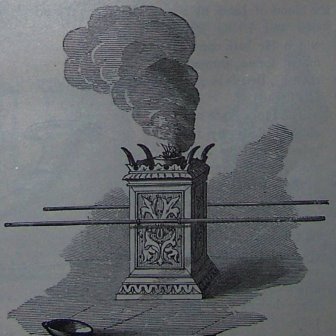Psalm 141 is a plea of the psalmist that he be heard and answered by his God.
O LORD, I call upon You; hasten to me!
Give ear to my voice when I call to You! (Psalm 141:1)
It is simply titled “A Psalm of David,” and is a cry for divine help from one in distress. Many writers have suggested that David composed this prayer while on the run from King Saul. This Psalm is very similar to the one before it and the two that follow, and the title of Psalm 142 says it was written by David “when he was in the cave.” It is likely that all four (140 through 143) were written around the same time, prior to the time of David becoming king.
In Torah portion Tetzaveh we read the instructions for the lighting of the Menorah (seven branched candlestick) and the offering on the altar of incense. These were probably on David’s mind as he composed this Psalm.
You shall put this altar in front of the veil that is near the ark of the testimony, in front of the mercy seat that is over the ark of the testimony, where I will meet with you. Aaron shall burn fragrant incense on it; he shall burn it every morning when he trims the lamps. When Aaron trims the lamps at twilight, he shall burn incense. There shall be perpetual incense before the LORD throughout your generations (Exodus 30:6-8).
May my prayer be counted as incense before You;
The lifting up of my hands as the evening offering (Psalm 141:2).
David offered his prayer as fragrant incense, lifting his hands as if to simulate the rising of the smoke from the altar. In the same way, Paul calls for “men in every place to pray, lifting up holy hands (1 Timothy 2:8). And David stresses the importance of “holy hands” in another of his Psalms:
Who may ascend into the hill of the LORD?
And who may stand in His holy place?
He who has clean hands and a pure heart (Psalm 24:3-4)
When the incense was offered, it was at the same time that Aaron and the succeeding priests were to trim the lamps. This process required new oil to be added to each light of the Menorah and for new incense to be added to what was burning on the altar. So David continues after comparing his prayers to the smoke of the incense, clearly understanding the symbolism of the incense and the light. He pours out himself before Yahweh. He is praying for sanctification by the Holy Spirit, represented by the oil, and for the “trimming” of his own life as a light in a dark world.
Set a guard over my mouth, O LORD
Keep watch over the door of my lips
Do not incline my heart to any evil thing (Psalm 141:3-4)
To begin his prayer of sanctification, he goes to his (and our!) most vulnerable and revealing area – the tongue. James wrote, “If anyone thinks himself to be religious, and yet does not bridle his tongue but deceives his own heart, this man’s religion is worthless” (James 1:26). David’s desire is to have a heart that is pure before God, and a life that shines like the holy light of the lamp in the sanctuary.
Yeshua (Jesus) identified two things as “the light of the world.” In John 8:12, He said “I am the light of the world,” and in John 9:5 He clarified it further, saying “While I am in the world, I am the Light of the world.” But in Matthew 5:14, he said “You are the light of the world.” If we continue reading this Sermon on the Mount in Matthew, we find that the entire discourse is about heart obedience to the Torah (instruction) of Yahweh. Fueled by the oil of the Holy Spirit, this is the way the world sees the light of Yeshua in us.
We often hear someone read Hebrews 13:15: “Through Him then, let us continually offer up a sacrifice of praise to God, that is, the fruit of lips that give thanks to His name.” It is important for us to continue with the next verse as well: “And do not neglect doing good and sharing, for with such sacrifices God is pleased” (Hebrews 13:16).”
In the Tabernacle, the light of the Menorah was to never go out and the smoke of the incense was to rise perpetually. And each morning and evening, when the smoke of the incense was offered, fresh oil was added to keep the lights burning. In the same way, we are to keep our prayers rising continually, “pray without ceasing” (1 Thessalonians 5:17), while our light shines “before men in such a way that they may see your good works, and glorify your Father who is in heaven” (Matthew 5:16). Then we will fulfill what Yeshua said is the foundation of all the Torah and the Prophets – to love God and to love man (Matthew 22:40).

